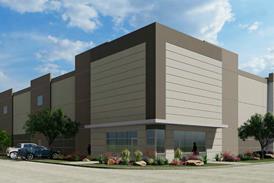All Ports and processors articles – Page 3
-
 News
NewsImpact of Typhoon Kong-rey on automotive logistics
Typhoon Kong-rey caused major port congestion in East Asia, delaying automotive supply chains and highlighting the need for digital resilience.
-
 Feature
FeatureMexico is the backbone of North American automotive supply
Mexico’s auto production hits record highs, but investment in logistics, security, and digital infrastructure is critical to meet growing North American demand.
-
 Video
VideoRed Sofa | Rubén Ballesteros on reshaping MG México’s logistics strategy
Discover how Rubén Ballesteros, head of logistics at MG México, drives growth with innovative strategies and a customer-first approach.
-
 News
NewsBrunswick port records ro-ro volume increases to October
The US port of Brunswick has increased finished vehicle and rolling equipment volumes following a major expansion of infrastructure.
-
 News
NewsToyota announces $1.4 billion investment in Mexico
Toyota commits $1.4 billion to expand its Mexico factories for its Tacoma truck and hybrid models, reinforcing its role in US-Mexico nearshoring.
-
 Partner Content
Partner ContentA more sustainable service with Suardiaz Group
Suardiaz is providing sustainable multimodal services for vehicle and container shipments in Europe combining shortsea and road freight with digital tracking.
-
 News
NewsUS-Mexico automotive trade: Policy shifts, labour costs and investments
The recent US election introduces fresh uncertainties for Mexico’s automotive supply chain, from policy shifts to rising labour costs and investment dynamics.
-
 News
NewsStrike at Vancouver port delays vehicle throughput
Finished vehicle imports are being delayed by terminal shutdowns at the Canadian port of Vancouver beause of a strike by members of the ILWU.
-
 Feature
FeatureRecap blog: ALSC Mexico 2024
Stay with us for real-time updates on critical trends like international trade, localisation strategies, supply chain software, organisational culture, automotive packaging, inventory management and more.
-
 Feature
FeatureMorocco becomes largest vehicle exporter to EU
Morocco now leads automotive exports to the EU, surpassing China and Japan. With robust logistics and rising production, North Africa gains momentum.
-
 News
NewsRPM appoints Frits Mehrtens to lead European growth amid industry shifts
RPM Freight Systems appoints Frits Mehrtens as managing director for Europe, aiming to expand operations and navigate challenges in finished vehicle logistics
-
 News
NewsVW Group opens dedicated vehicle terminal at Freeport
VW Group of America has opened a vehicle terminal at the port of Freeport on the US Gulf coast that will import and process up to 140,000 vehicles annually.
-
 News
NewsImpact of Hurricane Milton on auto operations not as severe as Helene
Finished vehicle operations are returning to normal at terminals in Florida following Hurricane Milton but full operational assessments are still being made
-
 News
NewsLithium battery fires disrupt ports in US and Canada
Container ports on the US west coast and the east coast of Canada have been disrupted by lithium-ion battery fires in the last week
-
 Feature
FeatureHow GM is boosting resiliency through predictive AI tools
GM is making its supply chain more predictive through its digital tools and innovations
-
 Video
VideoRed Sofa Interview | Jessica Hanson, Bosch on improving cross-border logistics
Jessica Hanson, vice-president of Logistics, Bosch North America on investing in innovations for efficient international logistics
-
 Feature
FeatureALSC Global 2024: Recap blog
Automotive Logistics is back with this year’s Automotive Logistics and Supply Chain Global 2024. Follow our blog for updates!
-
 News
NewsSándor Gacsó moves from Great Wall Motor to XPeng
Sándor Gacsó has been appointed as head of logistics for Europe at XPeng, moving from his role as European logistics manager at Great Wall Motor
-
 News
NewsHow process-mining in the automotive supply chain drives efficiency
Experts from Toyota, Celonis and PwC discuss the benefits of process-mining in driving automotive supply chain efficiency
-
 Feature
FeatureNissan benefits from Brunswick’s logistics mega centre
Nissan is benefitting from massive investment in infrastructure at the US port of Brunswick, alongside equipment makers moving from Savannah
























![Global[1]](https://d3n5uof8vony13.cloudfront.net/Pictures/web/a/d/s/global1_726550.svgz)




